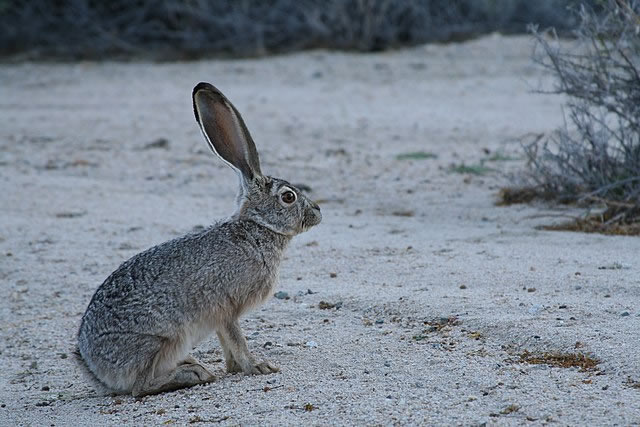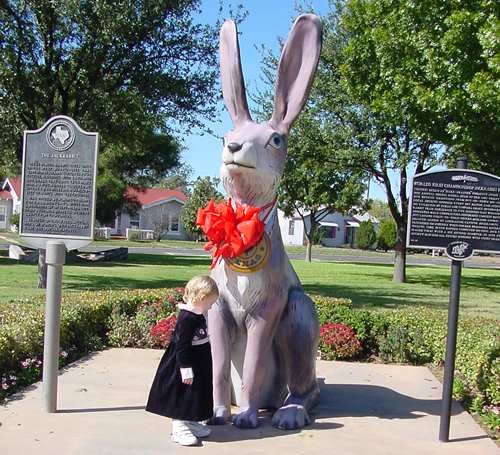Jackrabbit Stew and Other Delicacies. (original) (raw)
Books by
Michael Barr
Order Here:
A lot of the wild animals that roam the Texas Hill Country have wound up as dinner at one time or another, even animals not normally on the menu.
I've heard stories of people eating not only deer and turkeys but raccoons, possums and squirrels during hard times. I've also heard that, prepared properly, the taste of raccoon, possum and squirrel isn't all that terrible.
I've been told that during the Great Depression, people sometimes ate armadillos, aka "Hoover Hogs." If you are hungry you do whatever is necessary to put food on the table.
Of course when you eat raccoons, possums, squirrels or armadillos you have to get past the "ick" factor, which is the realization that you are eating a varmint more often seen flattened on the highway than baked, barbecued or fricasseed.
Add the jackrabbit to the list of undesirable entr�es. I'm told jackrabbit meat is lean, tough as boot leather and not very tasty at all.
Black-tailed jackrabbit taken March 19, 2006 by Jim Harper in Joshua Tree National Park
Wiki Commons
While a jackrabbit may not be a temptation to the taste buds, he is a sight to behold when running full tilt across open ground. He can lay his ears back and streak like a bullet. He can run up to 45 mph and change directions on a dime, without slowing down.
Jackrabbits are long, lanky and made to travel. Mother Nature built them for speed, not for taste.
Jackrabbits can also be pests when the actions of man throw nature out of balance.
In the early 20th century, farmers and ranchers pushed many of the wolves, wildcats and coyotes off the Great Plains and western Texas. Wolves, wildcats and coyotes killed livestock, but they also kept the jackrabbit population in check.
As the number of predators shrank, jackrabbits multiplied. By the millions these long-eared critters ran amuck over a large area of the United States, including parts of the Texas Hill Country, destroying field crops, pasture grass and gardens.
In March 1917 the Texas legislature passed a law offering bounties for wolves, wildcats and jackrabbits, but folksy, and soon to be impeached, Gov. Jim Ferguson vetoed the bill.
"I hereby give official notice," Ferguson wrote in his veto, "that the within House Bill 48 is vetoed and disapproved. In doing so I am not anxious to perpetuate either the scream of the wildcat or the howl of the wolf. In fact I am willing to go further and approve a large amount for the extermination of wolves and wildcats. We have all heard them too much. We hope they will hush and disturb us no more.
"But while this is true, I cannot give my official approval to anybody being paid to hunt jackrabbits. It is too much fun, and besides, if prices of meat continue to go up, we may need the jackrabbits to live on. I think an appropriation of 200,000,asprovided,wouldonlymean200,000, as provided, would only mean 200,000,asprovided,wouldonlymean10,000 for wolves and wildcats and $190,000 for jackrabbits. This is more rabbit meat than I think the state ought to buy at this time."
The government formally encouraged citizens to eat jackrabbits as another way of getting rid of the pesky creatures. An article in the January 12, 1918 edition of the Fredericksburg Standard, prepared by the state department of agriculture, listed 5 recipes for jackrabbit including canned jackrabbit, potted jackrabbit, jackrabbit sausage, jackrabbit chili and pickled jackrabbit.
The campaign to promote jackrabbit meat as a main course had only marginal success, due in part to the fact that eating jackrabbit is like gnawing on a Goodyear radial.
To be honest I have heard that jackrabbit stew isn't bad, but only if you throw away the jackrabbit and eat the stew.
J. Frank Dobie spent many nights around a campfire eating wild game. His recipe for jackrabbit stew goes like this: "Put plenty of water in a pot. Put in a brick. Put in a dressed jackrabbit. Boil 4 hours. Remove jackrabbit. Eat brick."
Jackrabbits, it seems, are safe from extinction at least for now. The taste alone is enough to keep them off the endangered species list.

